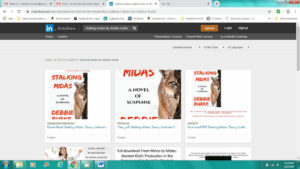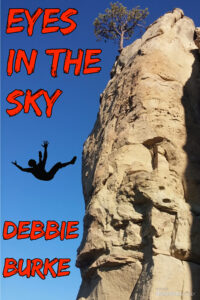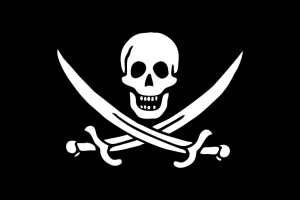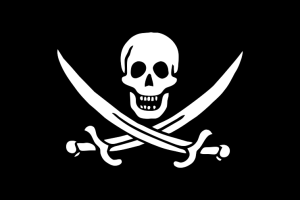By Debbie Burke

Photo credit: dolldreamer
A hot topic recently caught fire at the Author’s Guild discussion site: the embarrassing connection between social media giant LinkedIn and book piracy.
LinkedIn owns Slideshare, a knowledge-sharing site. Slideshare is also a popular venue for free downloads of books without the permission of the authors.
In other words, book piracy.
In September, 2019, Margaret Atwood’s highly-anticipated sequel, The Testaments, appeared on Slideshare for free, covered in this article.

Screenshot of my book on Slideshare without my permission
Thousands of other books, from famous to obscure, show up on Slideshare without the author’s permission or approval, including my own thriller, Stalking Midas.
How, you ask, do pirates make money from free book downloads?
They don’t…directly.
If you click on those teasers, you’ll likely wind up at phishing sites that contain malware and viruses. Their purpose is to mine credit card data and personal information. You might get free books but lose your identity or worse.
The Digital Millennial Copyright Act (DMCA) made such copyright violations illegal. Authors can demand illicit copies of their work be taken down. The procedure to file complaints is described here.

Photo credit: sasatro on Visual Hunt
But pirates aren’t exactly quaking in fear of punishment for their theft.
The fastest way for authors to find if their books are listed is to search Slideshare.net, using book title and author name.
LinkedIn, of course, is facing criticism for their tacit enabling of the crime. Here is their policy, which includes a complaint form to report copyright violations.
Although the form asks for the copyright number, that number is not necessary to register a complaint.
The form also requests URLs of the offending sites. Some books appear in hundreds of places. Tracking them all down further burdens authors, taking precious time away from writing to search for pirates.
Authors Guild members report mixed results after filing complaints with Slideshare. Some say the illicit links have been removed within a short time; others claim that, despite repeated complaints and takedown requests, the links remain up for months; still others report the links are removed but new ones pop up again.
Many authors believe LinkedIn–owned by tech giant Microsoft–should be sophisticated enough to flag repeat offenders and block pirate sites.
Romy Wyllie, author of several architecture books, was shocked to find those books as well as her memoir, Loving Andrew – A Fifty-Two-Year Story of Down Syndrome, on Slideshare. “I never thought of LinkedIn except as a professional social media site. I am considering cancelling my membership in LinkedIn.”

Whack a Mole
Photo credit: Eric Parker, Visual Hunt
Author Chris Dickon was dismayed to find four of his books on Slideshare. “I can deal with the problem as prescribed, though others have reported it to be a game of whack a mole, but my real question was – Linked In?? which purports to exist to help us all to develop and realize our professional and creative goals, economic progress, etc. but is corporately involved in the theft of our creative product and income, Linked In!?!”
Chris didn’t simply fill out the standard complaint form—he went straight to the top and contacted the CEO and co-CEO of LinkedIn. That resulted in a long phone conversation between LI representatives and Chris: “Linked In…presents itself as a friend and supporter of our professional well being, its very raison d’etre, [but is] involved in stealing from us.”
LI personnel indicated to him that, although they were aware of the problem, they didn’t realize the level of outrage it is causing among authors.
It really should come as no surprise to LinkedIn that authors are angry our work is being stolen via a supposedly legitimate platform.
LI followed up with Chris and invited him to stay in touch. At this point, he is satisfied with their handling of his complaint.
Other authors are publicizing the problem through social media.
William H. Reid, MD, MPH, tweeted: “SHAME on LinkedIn & subsidiary for letting book pirate scum distribute many of my books and thousands of others with no royalties to authors or publishers. Thanks for buying A Dark Night in Aurora from Amazon, B&N, & local bookstores! #LinkedIn #authorsguild”
Mary Rasenberger, Executive Director of the Authors Guild, is in discussions with Microsoft and urges all affected authors to file complaints to put LI on notice.
At this point, LinkedIn is hiding behind the safe harbor provision in DMCA, a loophole that protects online service providers (OSP). There are “two ways in which an OSP can be put on notice of infringing material on its system: 1) notice from the copyright owner, known as notice and take down, and 2) the existence of ‘red flags.'”
If an OSP ignores repeat offenders, they can lose their safe harbor status. Many aggrieved authors believe LI no longer deserves that protection.
Five days after filing my complaint and takedown notice with LI, I received an auto-reply of their action. Stalking Midas has been removed…for now.
As an aside, LinkedIn proudly touts their executive who holds the position of Head of Mindfulness and Compassion. The question is: when will LI become mindful of widespread, blatant copyright violation and show compassion toward authors who are being victimized?
When supposedly legitimate corporations like LinkedIn and Microsoft enable theft, all authors suffer.
~~~~
TKZers: Do your books show up on Slideshare? If so, what action did you take? What were the results?
~~~~

Debbie Burke will be watching to see if her new thriller, Eyes in the Sky, shows up on pirate sites. Publication date January 23, 2020, now available for pre-order here.










